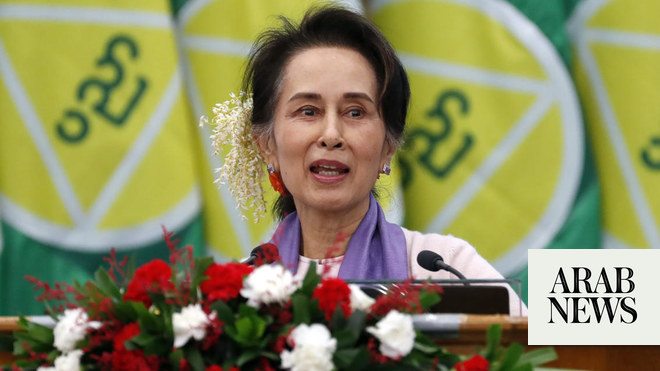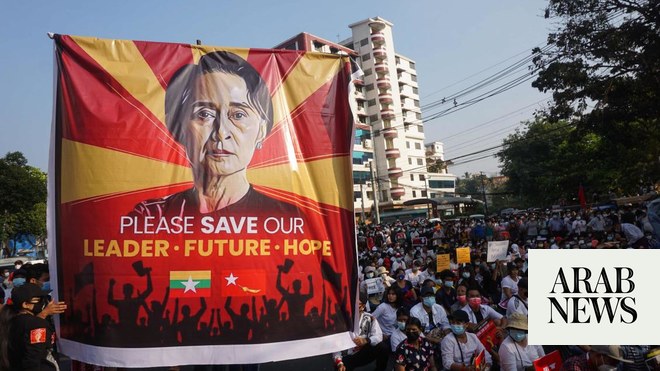
The party of Aung San Suu Kyi has called for her immediate release and for Myanmar’s 2020 election results to be acknowledged by the military, which took power in a coup on Monday.
The country’s elected leader, who was among dozens of political figures picked up by the army, reportedly remains under house arrest.
The coup has provoked widespread outrage around the world, but China and Russia blocked British-led efforts at the UN security council to deliver a consensus statement condemning the military takeover.
The streets of Myanmar’s main city, Yangon, were calm on Tuesday, but online many people turned their social media pictures red to signal their support for Aung San Suu Kyi, who won a landslide victory in November’s elections. In the evening, residents banged metal pots, a symbolic protest against the military, which previously ran Myanmar for some five decades. Some lit candles on their balconies.
A growing civil disobedience campaign has also emerged among doctors, with health workers from dozens of hospitals across Myanmar stating they will not work under the military, starting from Wednesday.
A statement on the Facebook page of May Win Myint, an official with her National League for Democracy, said the party’s executive committee urged the military to acknowledge the results of November’s election and called for the parliamentary session due to start this week to go ahead. It also called for Aung San Suu Kyi’s immediate release.
Later on Tuesday, an official from the National League for Democracy said in a message on Facebook that Aung San Suu Kyi was in good health and that there was no plan to move her. It is not possible to verify such posts.
The UN special envoy on Myanmar, Christine Schraner Burgener, briefed the UN security council in closed session on Tuesday.
“She didn’t hold back at all,” a diplomat who was in the chamber said. “She really called for a clear signal of council support for democracy in Myanmar.”
China and Russia however blocked a British-drafted statement condemning the coup and calling for its reversal, while India and Vietnam also voiced reservations.
“China, weren’t actively supportive of the military vocally, but they talked about stability and internal affairs and tried not to say anything at all,” a diplomat said. “Russia supported China, and then India and Vietnam were just a bit more nuanced […] and said it was important to consider regional efforts.”
Louis Charbonneau, UN director for Human Rights Watch, condemned the security council’s silence.
“The abject failure of the security council, thanks to the likes of China and Russia, to hold Myanmar’s military leaders accountable for their crimes helps them feel they can engage in horrific abuses and pay little or no cost,” Charbonneau said.
A spokesperson for the Chinese UN mission said: “It’s also our hope that any move of the council would be conducive to the stability of Myanmar rather than making the situation more complicated.”
Beijing has invested billions of dollars in projects in Myanmar. The state-backed Xinhua news agency described the military take over with the euphemism: “major cabinet reshuffle”.
The US president, Joe Biden, threatened sanctions and called for governments to press for the military to release detainees. The UN security council will meet on Tuesday to discuss the matter.
A US state department official said the US had officially designated the events in Myanmar as a coup, triggering an immediate review of sanctions, aimed at the generals and military-related companies. The official pointed out that some of the country’s military leaders were already under sanction, and the intent of the review was to make sure humanitarian relief was not affected.
“We’ll take action against those responsible, including through careful review of our current sanctions posture, as it relates to Burma’s military leaders and companies associated with them”, the official said. “The coup restrictions apply to US foreign assistance for the government of Burma, and we will continue programmes for the people of Burma that benefit them directly including humanitarian assistance to the Rohingya and other populations in need.”
Almost all US aid to the country, budgeted as $109m for this year, goes through civil society institutions, and not directly through the government. The US is also talking to regional partners with closer ties with Myanmar, like Japan and India, to discuss coordinated action, the official said.
One possible area where new sanctions are possible is in the field of communications. The advocacy group, Justice for Myanmar, published a report in December outlining an array of satellite networks dominated by the Myanmar and Vietnamese military, which use western supplied technology.
Army chief General Min Aung Hlaing said on Tuesday that the military takeover was “inevitable” after the government failed to respond to its grievances over alleged electoral fraud. But the military has offered little response to the flood of foreign criticism.
On Tuesday, hundreds of members of Myanmar’s parliament remained confined inside their government housing in the capital. One unnamed lawmaker told Associated Press that he and about 400 others could speak to one another inside the compound and communicate with their constituencies by phone, but were not allowed to leave the complex in Naypyitaw. Police were inside the complex and soldiers were outside, he added.
On the streets of Yangon, life seemed, on the surface, to be continuing as normal, and there did not appear to be a greater security presence.
Many residents, however, were angry. “The military has already ruled us for five decades. It took so much effort for us to gain democracy and it’s gone, just like that, overnight. We no longer expect anything good from this country,” said Khin, a teacher.
“As for the military, they don’t have an ounce of empathy. They are willing to kill civilians for their own selfish benefit.” She used to merely dislike the military, she said. “Now I am utterly disgusted by them. They’re a bunch of monsters.”
Myae, 69, an exports trader who fled to Thailand during the 1988 pro-democracy uprisings, said he was in a state of denial. “I want our government back. It’s either that, or interference from other countries.
“I really look down on these people [the military]. They are illegitimate and illiterate. They don’t have the ability, or the right, to rule us. They have no respect for the people,” he said.
He feared that the country’s development, as well as his own work and income, would suffer. “But we’re watching and we are hoping. This is not the end. History will repeat itself over and over again.”
While some health workers have said they will refuse to work under the military, the Yangon Youth Network activist group, one of the biggest in the country, said it had also launched a civil disobedience campaign, one of the first signs of organised protest action against the military coup. The All Burma Federation of Student Unions (ABFSU) also urged government workers to stop working for the new cabinet.
Some in Yangon called for the international community to put pressure on the military. The UN security council has been criticised for its failure to respond to previous abuses by the military, such as the violent crackdown in Rakhine state in 2017, which forced 700,000 Rohingya to flee to Bangladesh. They remain stranded in squalid and cramped refugee camps over the border.












